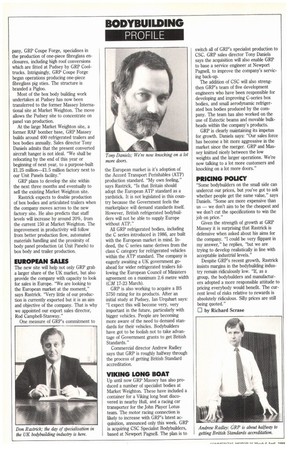BODYBUILDING PROFILE
Page 58

If you've noticed an error in this article please click here to report it so we can fix it.
pany, GRP Coupe Forge, specialises in the production of one-piece fibreglass enclosures, including high roof conversions which are fitted at Pudsey by GRP Cooltrucks. Intriguingly, GRP Coupe Forge began operations producing one-piece fibreglass pig sties. The structure is branded a Pigloo.
Most of the box body building work undertaken at Pudsey has now been transferred to the former Massey International site at Market Weighton. The move allows the Pudsey site to concentrate on panel van production.
At the large Market Weighton site, a former RAF bomber base, GRP Massey builds around 400 refrigerated trailers and box bodies annually. Sales director Tony Daniels admits that the present converted aircraft hanger is not ideal. "We shall be relocating by the end of this year or beginning of next year, to a purpose-built 21.25 million-21.5 million factory next to our Unit Panels facility."
GRP plans to develop the site within the next three months and eventually to sell the existing Market Weighton site.
Rastrick expects to double production of box bodies and articulated trailers when the company moves across to the new factory site. He also predicts that staff levels will increase by around 20%, from the current 150 at Market Weighton. The improvement in productivity will follow from better production flow, automated materials handling and the proximity of body panel production (at Unit Panels) to box body and trailer production.
EUROPEAN SALES
The new site will help not only GRP grab a larger share of the UK market, but also provide the company with capacity to look for sales in Europe. "We are looking to the European market at the moment," says Rastrick. "Very little of our production is currently exported but it is an aim and objective of the company. That is why we appointed our export sales director, Rod Campbell-Stanway."
One measure of GRP's commitment to the European market is it's adoption of the Accord Transport Perishables (ATP) production standard. "My own feeling," says Rastrick, "Is that Britain should adopt the European ATP standard as a yardstick. It is not legislated in this country because the Government feels the marketplace will demand standards itself. However, British refrigerated bodybuilders will not be able to supply Europe without ATP."
All GRP refrigerated bodies, including the C series introduced in 1986, are built with the European market in mind. Indeed, the C series name derives from the class C category for refrigerated vehicles within the ATP standard. The company is eagerly awaiting a UK government goahead for wider refrigerated trailers following the European Council of Ministers agreement on a maximum 2.6 metre width (CM 17-23 March).
GRP is also working to acquire a BS 5750 rating for its products. After an initial study at Pudsey, Ian Urquhart says: "I expect this will become very, very important in the future, particularly with bigger vehicles. People are becoming more aware of the need to demand standards for their vehicles. Bodybuilders have got to be foolish not to take advantage of Government grants to get British Standards."
Commercial director Andrew Radley says that GRP is roughly halfway through the process of getting British Standard accreditation.
VIKING LONG BOAT
Up until now GRP Massey has also produced a number of specialist bodies at Market Weighton. These have included a container for a Viking long boat discovered in nearby Hull, and a racing car transporter for the John Player Lotus team. The motor racing connection is likely to increase with GRP's latest acquisition, announced only this week. GRP is acquiring CSC Specialist Bodybuilders, based at Newport Pagnell. The plan is to switch all of GRP's specialist production to CSC. GRP sales director Tony Daniels says the acquisition will also enable GRP to base a service engineer at Newport Pagnell, to improve the company's servicing back-up.
The addition of CSC will also strengthen GRP's team of five development engineers who have been responsible for developing and improving C-series box bodies, and small aerodynamic refrigerated box bodies produced by the company. The team has also worked on the use of Eutectic beams and movable bulkheads within the company's products.
GRP is clearly maintaining its impetus for growth. Daniels says: "Our sales force has become a bit more aggressive in the market since the merger. GRP and Massey knitted nicely between the low weights and the larger operations. We're now talking to a lot more customers and knocking on a lot more doors."
PRICING POLICY
"Some bodybuilders on the small side can undercut our prices, but you've got to ask whether people get the same value," says Daniels. "Some are more expensive than us — we don't aim to be the cheapest and we don't cut the specifications to win the job on price."
Given the strength of growth at GRP Massey it is surprising that Rastrick is defensive when asked about his aims for the company. "I could be very flippant in my answer," he replies, "but we are trying to develop realistically in line with acceptable industrial levels."
Despite GRP's recent growth, Rastrick insists margins in the bodybuilding industry remain ridiculously low. "If, as a group, the bodybuilders and manufacturers adopted a more responsible attitude to pricing everybody would benefit. The current level of risks relative to rewards is absolutely ridiculous. Silly prices are still being quoted."
0 by Richard Scrase
















































































































































